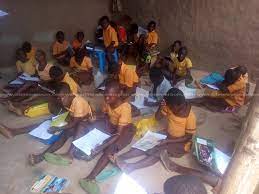A total of 324 Basic Schools in the Upper West Region are organising 894 classes in the open air due to inadequate classroom infrastructure, disrupting teaching and learning during the rainy season and the harmattan periods.
Mr Razak Z. Abdul-Korah, the Acting Upper West Regional Director of Education, made this known during the 2022 Education Sector Performance Review forum held in Wa to reflect and address the shortfalls in education delivery in the region.
He appealed to municipal and district assemblies to commit more resources into the provision of classroom blocks in the affected schools to make basic education accessible in the communities.
He said the region scored 48 per cent in science amended to 55 per cent, recorded 44 per cent in English Language upgraded to 50 per cent, Mathematics 48 per cent rose to 55 per cent, scored 65 per cent in Social Studies and improved to 70 per cent at the 2021 and 2022 WASSCE.
Mr Abdul-Korah said at the Kindergarten, Primary and Junior High Schools, girls enrolled in school at the right age were more than boys over the past three years, which needed to be researched into to find out the possible causes of delay in enrolment of boys in the schools.
The region had not met the National Education Strategic target of 99 per cent transition rate from Primary Six to Junior High School form One; averagely, 20 per cent of students completing Junior High School form three, were either into TVET institutions or made to continue to Senior High School.
Mr Abdul-Korah said most schools located in small scale mining sites were performing below five per cent in the Basic Education Certificate Examination (BECE) while the trend of BECE absenteeism had been attributed to the engagement of pupils in illegal mining.
The BECE absentees reduced from 393 in 2020 to 260 in 2021 and 78 in 2022 whereas the number of candidates qualifying for placement into Senior High School increased from 89.2 per cent to 98.1 per cent.
Improved Senior High School performance in all score subjects stood at 14 per cent on the average, improved quality of teachers across all levels, namely Kindergarten 5.2 per cent, Primary 14.7 per cent, Junior High School 2 per cent and Senior High School 5.2 per cent.
Mr Abdul-Korah expressed disappointment about the engagement of school children in illegal mining and other businesses such as tricycle driving, weaving after school hours thereby making school children more money oriented and with little regard for studies.
He called for support to ensure effective supervision and monitoring in schools to improve performance and discipline in schools in the region.








![“I made Shatta Wale who he is today” – Singer Kay Smooth alleges [Video]](https://ghananewss.com/storage/2023/04/Kay-Smooth-Shatta-Wale-100x75.jpeg)

![Mr Logic’s Red Panther record label officially signs two Afro-dancehall artistes[Video]](https://ghananewss.com/storage/2023/05/Mr-Logic-signs--100x75.jpeg)






